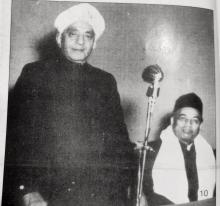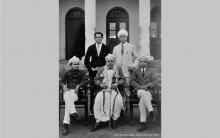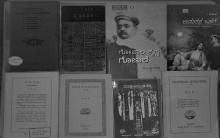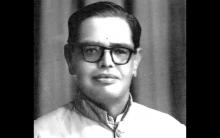Author:sandeep
While Parivrājaka seems to be miffed, he is also compassionate enough to reconcile that Śāṇḍilya being in this ephemeral world is bound to be behave that way! The verse which describes his rationale while not being as brilliant as Bhartṛhari can well be a part of an extrapolated vairagya collection.
देहो रोगनिधिर्जरावशगतो लीनान्तकाधिष्ठितो
यो नित्यप्रतिघातरुद्धविषयस्तीरे यथा पादपः।
तं लब्ध्वा सुकृतैरनेकगुणितैर्देहात्मना विस्मितो
मत्तो यो बलरूपयौवनगुणैर्देीषान्न तान् पश्यति ॥३॥
A fool went to a lake to drink water; he saw the reflection of a bird called svarṇa-cūḍa and thought that there was gold fallen in the waters. He jumped into the lake to fetch the gold. He, however, did not procure anything. His father saw him taking a dip in the water again and again, shooed away the bird and explained to him that it was not real gold. People like him are comical, cause humour, but are in pain within themselves.
~
Today, physiology has developed as an independent branch of study. We must take its help in our analysis of movement vocabulary. Physiology can help us understand what joints can take what kind of movements and the limitations of the different parts of our body. We can also get an idea about the extent to which each individual can contribute based on his bodily limitations. It is all the more important to analyse every movement from the point of view of aesthetics while keeping physiology as the backdrop. It is only beauty that matters in art – everything else is peripheral to it.
During a conversation with S R Ramaswamy, he mentioned to me that in the 1940s, K M Munshi had asked Sastri to write about the Aryans in the first volume of The History and Culture of the Indian People. Sastri asked, “I can definitely write it but do you have the courage to publish it?” It turns out that a great nationalist of the stature of Munshi too didn’t have the guts to publish the entire essay and printed a paltry two-page summary of Sastri’s writing in the first volume.
Modern literary theory usually insists that a poet should not come in the way of the natural development of events and characters. If he gets personally involved, the work runs the risk of turning into a pamphlet meant only to air the author’s pet views. It would then become an artificial construct, straying away from its primary purpose of leading the readers to rasa.
Here is an example of a critique written by Sastri and what is noteworthy is that instead of it becoming merely reactionary, it offers a wonderful commentary on Indian culture.
In Pāṭalīputra lived two brāhmaṇas - Yajñasoma and Kīrtisoma. Among the two, the younger one, Kīrtisoma, flourished through the business he set up with the wealth he inherited. Yajñasoma, however, ate and drank and gave away generously whatever he had and eventually became a pauper. He couldn’t bear to be thus among his relatives and decided to migrate to a different kingdom. However, he couldn’t even muster money for the journey, even from his younger brother. Kīrtisoma did want to help his elder brother with some money out of affection, but his wife wouldn’t let him.
Though instantly smitten, Śāṇḍilya realises he needs to be rich once he comes to know that she is a courtesan! Meanwhile the Yamapuruṣa, invisible to everyone, arrives and waits for the right time to do his master’s bidding. When Vasantasenā wants to pluck some of the shoots of the Aśoka tree, the Yamapuruṣa disguises himself as a snake and bites her. She loses consciousness. Parabhṛtikā laments her loss and is about to venture out to bring Vasantasenā’s mother. Meanwhile Śāṇḍilya too is sad and implores Parivrājaka to share his sorrow.










